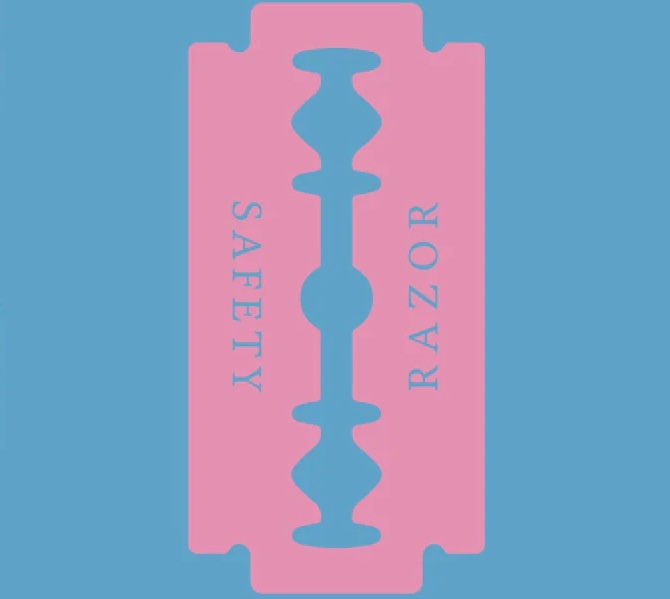
Review by Cara Waterfall
There is the body of myths passed down from generation to generation, and then there is our own body of myths, which spring from memory. In her debut poetry collection, Safety Razor, London, Ontario native Emily Osborne intertwines the two as she interrogates her personal history with lyrically rich and sensory language, while also exploring the natural world and Norse mythology.
The anatomy of the safety razor mirrors the book’s construction as she engages with her childhood in First Cuts, unearths uncomfortable truths in Bare Bones, and eventually, exposes her own vulnerability in Flesh Meets, with the birth of her first child. Interspersed between her candid portraits are fresh perspectives on an eclectic range of subjects from “Jumbo” to “Scrimshaw” to her Malahat Far Horizons Award for Poetry-winning poem, “Venn diagrams.”
In an interview with Malahat volunteer, Rose Morris, Osborne described poetry as: “…one of our most embodied art forms…[maintaining] a sense of being close to the body through discernable sound patterns, fluid or forcible rhythms, or through descriptions of embodied, kinetic and sensory experience”. Safety Razor exemplifies this approach as Osborne alternates between a variety of poetic forms, from tercets and couplets to prose poems, without sacrificing cadence, cohesion, or imagery.
Nowhere is this more apparent than in “Venn diagrams” in which Osborne creates and integrates a plethora of images and sounds. She has a talent for synthesizing all five senses, while her syntax and whitespace mimic the kaleidoscopic and chaotic mind of a child:
In school we group foods into circles:
write here the epithelium’s ripe plums
write here rhubarb puckers rinds citrus-stung
write here glutamate of muscle
chloride pep of pretzels. the rings’ overlap
write flavours that cross ion channels
that sweet-salt glut of peanut butter,
mouth stuck through lunch
alone at a round table.
That sucrose rush from recess, my gobstoppers
swiped by bigger fists
shellacked with citric acid
Osborne also shines in vulnerable meditations, where she unflinchingly turns her gaze inward. In “20-week scan,” the nerves of impending parenthood are as palpable as the tenderness she feels for her baby:
…After the first
made-up years, our words static back
until we’re parent ships projecting signals,
hoping you’ll echo. The bigger you grow,
the less we know you’ve heard us
our sonar broken
on open ocean
As in water, Osborne floats between various states of being, while assessing their wider complexities. Indeed, water imagery plays an important and ominous role in this collection: in “Sharp Parables,” lakes adopt a sinister form as they pertain to fables; in “Weather Forecasting,” she refutes the idea that a man might have “god-eyes” to predict the weather; and in “Auðr mourns her dead brother,” she adopts syntax and imagery that mimic the ocean.
Osborne has an uncanny ear. Her poems resound with alliteration, assonance, consonance, and an endlessly inventive brio. In “Diacritics,” accents are given new life:
Maybe all vowels were once sister chromatids,
but now we carve grave and caret on separate
word trees. I can’t read your DNA or lips.
You said my consonants split and replicate
like cells in tumours. Writing them makes
you stressed? Possessives are tricky on paper…
Osborne has a MPhil and PhD from Cambridge University in Old English and Old Norse-Icelandic Literature, and some of the poems in this book are her translations of Old Norse-Icelandic skaldic verse. From “Sonatorrek” (“the irreparable loss of sons”):
The cruel sea hacked
through the fence of my kin.
A gap rots, unfilled,
where my sons flourished.
I carried one son’s corpse.
I carry word-timber,
leafed in language,
from the speech-shrine.
One can understand Osborne’s passion for Old Norse-Icelandic poetry because it dovetails neatly with the ambiguity and surreal imagery in her more personal poems, and how she harnesses the power of rhythm, melody and metaphor. In particular, her use of kennings — succinct compound or figurative phrases that replace a noun — (“word-timber,” “speech-shrine,”) are a testament to her ability to seamlessly integrate Old Norse-Icelandic traits into her work.
Osborne’s poised and layered debut offers a fearless perspective on the many emotional and physical landscapes we navigate, without providing any easy answers. Although the deft wordplay and variety of poetic forms and subjects are abundant, they never overtake the profound reflections Osborne has regarding modern domesticity, motherhood or the state of the world. The meticulously crafted poems of Safety Razor invite you to peel back the layers and pay attention to our miraculously flawed world.
Ottawa-born and Costa Rica-based, Cara Waterfall’s poetry has been featured in Best Canadian Poetry, The Fiddlehead and more. She won 1st and 2nd place in PULPLiterature’s 2022 The Magpie Award for Poetry, Room’s 2020 Poetry Contest and was shortlisted for the 2019 CBC Poetry Prize. She has a diploma in Poetry & Lyric Discourse from The Writer’s Studio at SFU and currently reads for Frontier Poetry. www.carawaterfall.com